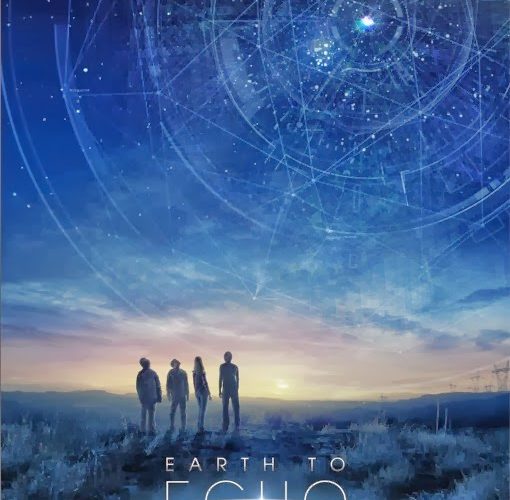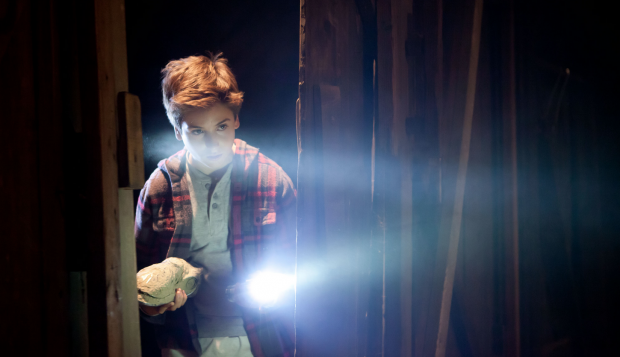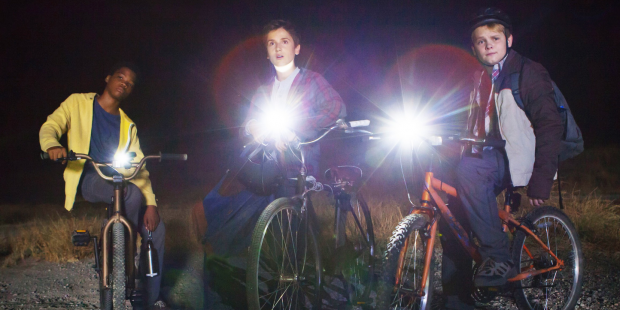In 1982 it took a whole movie for E.T. to place a call back to his home planet. He might have found more luck with the trio of kids in Earth to Echo, who always seem to have a surplus of cell-phones and tech gadgets lying around. Echo, a family friendly adventure crafted in the E.T. mold, also features an endearing alien visitor trying to get off our blue rock with the help of a few pre-teen friends. The only new wrinkle in this version is that ever-present technology; this is The Goonies for the YouTube generation, featuring a charming trio of boys who spend most of their time being so self-aware of themselves as stars of a ‘story’ that any genuine moment where they come off as just vulnerable kids is both poignant and disarming.
That’s all part of the point of Echo, although one could wish for a bit more drama and bite in what ultimately amounts to a mush-mouthed version of the Amblin movies many an 80’s kid grew up with. Instead of capitalizing on the nostalgia with a replicated aesthetic — the way J.J. Abrams did with Super 8 — director Dave Green and writers Henry Gayden and Andrew Parnay purposefully set-out to update this particular brand of suburban fantasy with an emphasis on a socially networked youth that still feel isolated where it counts. The film begins with the last days of togetherness for friends Alex (Teo Halm), Tuck (Brian “Astro” Bradley) and Munch (Reese Hartwig), three awkward kids all facing a move because the neighborhood they live in is about to be demolished in favor of a freeway.
Tuck is the would-be filmmaker of the lot, and Bradley is energetic in demonstrating his can-do agency while suggesting an emotional fragility the character likes to hide. Ultimately, Tuck is just as dependent on the solidarity of this little gang as his two more outwardly hapless compatriots. Halm’s Alex is an orphan, and although the movie spends time reminding us of this fact, there’s not much of that element reflected in the performance. He’s intended as the no-nonsense, scrappy sidekick, and the one with the most connection to the otherworldly creature that enters the story. Munch is an amiable, nutty geek in the Chunk mode, but Hartwig—the best of the young performers on display—makes him ring with a plausible eccentricity. Munch is that kid you kept a pitiable distance from in middle school, only to realize years too late that he was one of the most interesting people there.
Their adventure is ignited when something causes all the cell-phones in the area to “barf,” forming what looks like thermal photography of internal organs but is actually a map leading them outside of town. In classic fashion, the boys stage a bogus sleepover to obscure one last group trip; a journey into the desert on their bikes to find the location of the signal. What they find is Echo, an adorably designed alien visitor that reminds of Bubo the Owl crossed with those little space hamburgers from Batteries Not Included. Using his ability to mimic behavior and influence Earth technology, Echo leads the boys on a scavenger hunt for mechanical parts that can facilitate his return home. To check off more genre tropes, there’s the popular blonde they all yearn for (Ella Linnea Wahlestedt) and the dubious, shifty adult (Jason Gray-Stanford) who’s not who he appears to be.
What I haven’t mentioned yet is that Earth to Echo has been conceived in that format we’ve come to know as ‘found footage,’ although surely a new terminology is necessary now that we’ve finally moved from the idea that the discovered films are always documents of the doomed. No, there’s not a fearsome fate awaiting the kid heroes of Echo, but the filmmaking technique doesn’t add anything here, even when riffing on the self-awareness that comes with being on camera constantly. If anything, the first-person handheld technique distances us from any potential wonder or excitement we might share with this kid’s on their adventure. Early on there are some nice touches; Tuck turns on the soundtrack of Robin Hood: Prince of Thieves to underscore the planning of the big event, and in one pivotal moment sends a plea across YouTube for anyone meeting Munch to just give the kid a chance before they write him off.
These are character moments, and whenever Echo is sticking to the kids and their camaraderie, it mostly works as intended. There’s a gentle ode to friendship that comes through in the film’s old-school stylings, and for young audiences this might prove much more thrilling than the bombastic punch to the face that is Transformers: Age of Extinction. It’s when Green arrives at the fantastical stuff that Echo loses its momentum and drive. The alien itself is too generic and poorly developed as a character. We are told more often than shown that he has a connection with the boys; imagine a cut of E.T. that removes the pivotal forest sequence, the frog dissection, or the building of the device, but still ends with Elliot telling the strange traveler that he loves him. Some of the special effects are nifty—there’s a truck deconstruction that is better in concept than execution—but there’s hardly ever a sense of wonder here. At the end, when something suitably huge and pivotal is happening, we’re mostly checking off the places where we’ve seen it before.
It’s hard to be too down on Echo, because there’s a lack of good family entertainment out there, and the filmmakers have their heart and sensibilities in the right place. Still, as the film itself strives to make a case that our own imagination and relationships have been stalled by our current cultural hang-ups, the final product feels a lot like that; just product, glossy and cheerful but empty in a way that’s initially hard to pinpoint. It’s perfectly fitting for a matinee, but the best use of this particular summer trifle is providing a map for clueless younger generations to arrive at those stronger, inspiring works a few decades removed from them.
Earth to Echo is now playing in wide release.



